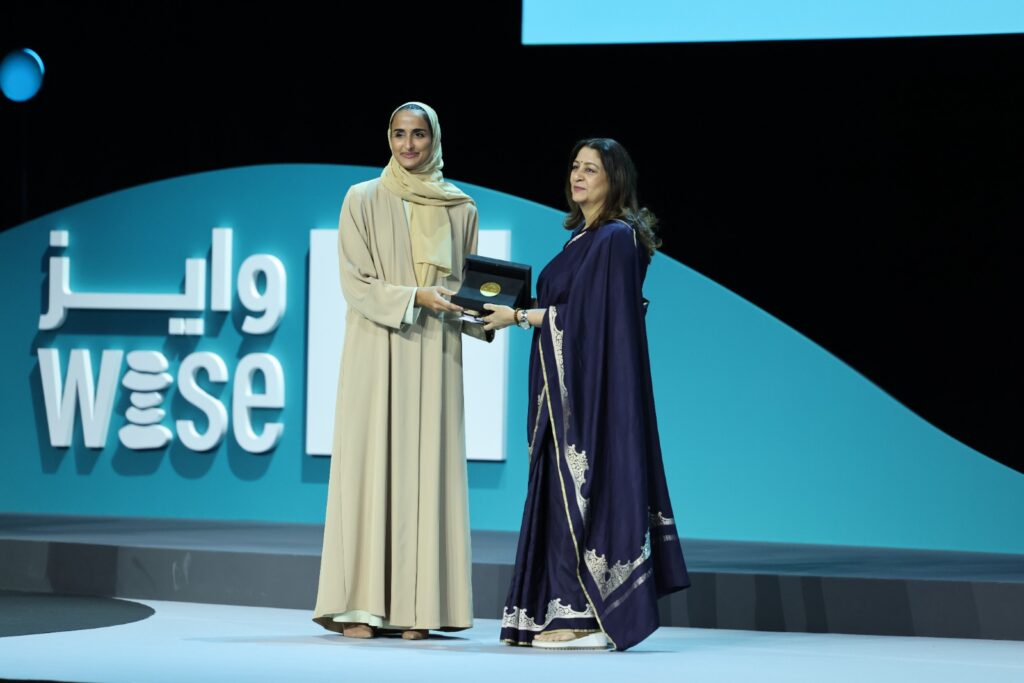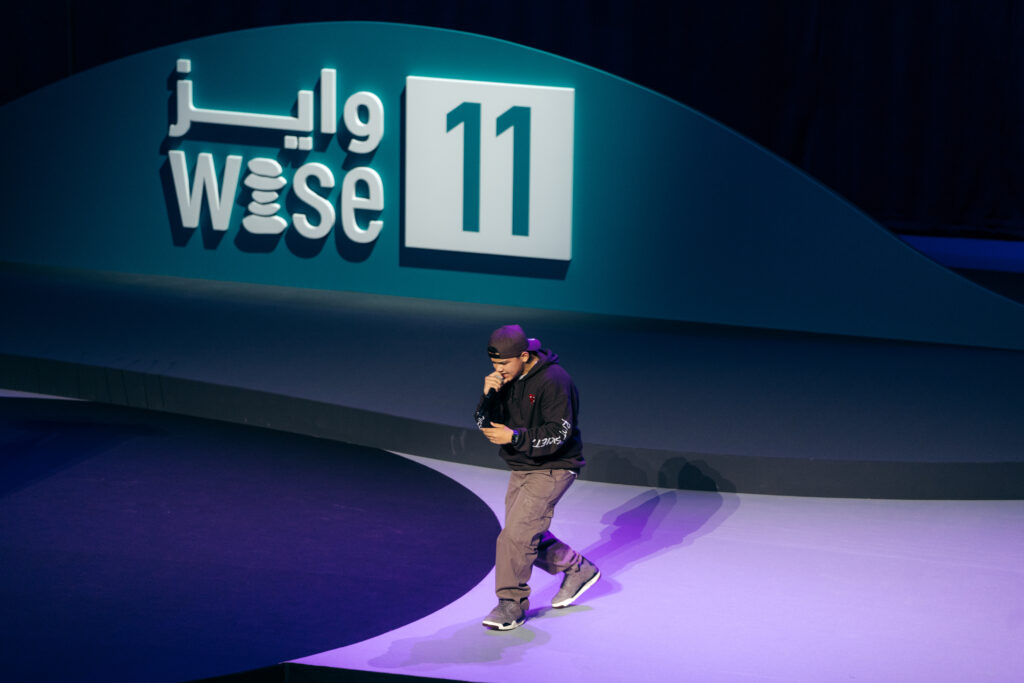Edwin Naidu
THE suffering of the people of Palestine hung like a cloud over proceedings at the World Innovation Summit for Education (WISE), a global platform for education established by the Qatar Foundation, which began today on November 28, at the Qatar National Convention Centre (QNCC) with a powerful account of the destruction of places of learning according to Her Highness Sheikha Moza bint Nasser, the Chairperson of Qatar Foundation (QF).
Opening the 11th edition of the WISE Summit held under the theme ‘Creative Fluency: Human Flourishing in the Age of AI’, Sheikha Nasser told about 1200 delegates that for more than 20 years the foundation has supported education in Palestine, and especially in Gaza.

“We built the Al Fakhoora School as the first of many educational projects in Gaza. It has since been shelled by the Israeli Forces. The projects, which now constitute the Al Fakhoora program include teaching and training, building schools and universities, and funding specific research projects that are not available elsewhere in the strip. They also provide psycho-social support to cope with the devastating reality of life in times of crisis in Gaza.
“Since the start of the current Israeli aggression in October, 36 Education Above All supported schools and universities have been completely or partially destroyed. And so, Israeli forces have destroyed so much that has been accomplished by the Al-Fakhoora program. With the collapse of each school and each university, we lose a pillar in the foundation of the future. For every child deprived of education because of violence, another pillar is lost,” she said.
Her Highness said war disrupts educational institutions, exhausts health sectors, and prevents the wheels of development from turning. “Those very wheels are buried deep in the debris. And because of this the greatest threat to a society’s progress occurs after the ceasefire. The victims, their old lives buried under the rubble, must rise from the ashes left by the destruction, and start again with nothing,” she said.


“And connected to education — is anything not connected to education? — is the focus of this year’s WISE Summit: the potential of artificial intelligence: addressing related issues, and how to improve the ways we harness its capabilities and possibilities. During the war in Gaza, we have seen artificial intelligence being used to fabricate stories, falsify facts, and block publications, photos, and videos that include atrocities committed by the Israeli occupation forces against the people of Gaza and the West Bank. This makes us wonder: whose stories does artificial intelligence select to be archived as history? Whose history will be told? Which ideas will be chosen as the most credible? And then: how do we maintain our independence and preserve our educational values? How do we remain sovereign societies?” she asked.
Sheikha Nasser said it was important to ensure that WISE is a platform for new ideas that keep pace with the changes taking place in the world, and the obstacles that education faces in certain countries for obvious reasons.
“And I say as I have said many times before: there is no alternative but to innovate if we are to find solutions to intractable problems. This is the role that WISE plays. In tackling the challenges of education, scientists and researchers — like you — bear an academic and moral responsibility. You have made an honorable choice, and we here at WISE are privileged to support you on your noble paths. You excel in your efforts, and we value all that you do. I bless your past and future efforts and wish you a successful conference.
During the opening plenary, Her Excellency Sheikha Hind bint Hamad Al Thani, Vice Chairperson and CEO of Qatar Foundation, awarded the prestigious WISE Prize for Education to Safeena Husain, Founder and Board Member of Educate Girls. The WISE Prize for Education is the first global award of its kind that honors an individual for an outstanding contribution to education.
Husain was recognized for dedicating 16 years to building the non-profit organization focused on empowering communities for girls’ education in some of India’s hardest to reach villages.
Her journey with WISE began with a WISE Award in 2014 that acknowledged Educate Girls for its positive social impact and ability to scale. Over the years, Educate Girls has mobilized more than 1.4 million girls for enrolment and supported over 1.9 million children in their learning in India. Thanks to a precision targeting method using AI, Educate Girls is able to target, in 5 years, the same number of out-of-school girls, which would otherwise require 45 years. Through a network of over 21,000 community-based champions in some of the most marginalized communities in the country, the organization has been working to break the intergenerational cycle of inequality and exclusion.
Under Husain’s guidance, Educate Girls has evolved into a leading global force, harnessing innovative financing and AI technology to bridge the gender gap in education. This is mirrored in its global milestones: the delivery of the world’s first Development Impact Bond in education, and the organization becoming Asia’s first The Audacious Project – which, housed at TED, is a collaborative funding initiative catalyzing social impact on a grand scale.
“This is a collective win for all of us working toward girls’ education, right from the government and local communities to dedicated gender champions and our supporters. It is a testament to the array of initiatives that are actively addressing this global challenge, embracing grassroots innovations and technology-driven solutions that are tirelessly working to ensure that every girl, in every village, is in school and learning well.
“Girls’ education is the closest thing we have to a silver bullet to solve some of the world’s most complex problems. We must recognize that the right to education is a girl’s inherent right – a right that must always take center stage.”
Among the highlights of the opening plenary was a heartful performance by 15-year-old Palestinian rapper Abdulrahman AlShanti – known as MC Abdul. He was given a standing ovation.


The official strategic partner of WISE 11, Education Above All (EAA), a global non-profit organization established by Her Highness Sheikha Moza, dedicated to transforming lives through
education, is at the forefront of the summit’s program creating dialogue around inclusive education, innovative financing, and protecting education in crises.
Day one was spread across distinct thematic zones that included diverse sessions covering some of the core summit discussion topics: Classrooms of the Future; AI and Digital Sovereignty; and Building Ethical AI. A series of thought-provoking panel discussions and policy roundtables explored topics such as strategies for educators to future-proof classrooms in the era of AI and navigating the impact of AI superpowers to build an inclusive global AI landscape, among others.
Young innovators and advocates led discussions on a range of topics including personalized learning for students with disabilities, and cultural perspectives of Arabic learners in classrooms at the Youth Studio.
Jeffrey Sachs, University Professor and Director of the Center for Sustainable Development, Columbia University, addressed the economic impact of conflict on education in his keynote speech at the session.
INSIDE EDUCATION










